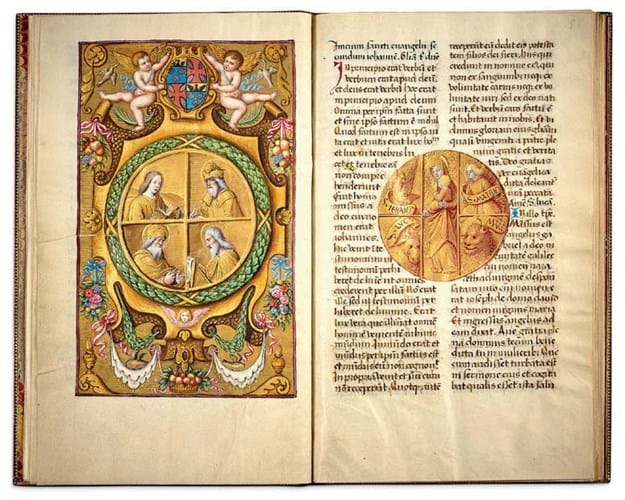Two late 15th century Books of Hours offered by Aguttes on June 15 dominated bidding.
The Petau Book of Hours, with 16 medallions in gold camaïeu by Jean Poyer of Tours (fl.1490-1520), sold at €4.29m (£3.77m) – more than four times the top estimate.
It takes its name from the Petau family of bibliophiles – the arms of Alexandre Petau (1610-72) appear inside – but was probably decorated c.1495.
The attribution to Poyer, whose patrons included Anne of Brittany and her two royal husbands (Charles VIII and Louis XII), was made by Mara Hofmann in the 2004 catalogue raisonné Jean Poyer: Das Gesamtwerk.
In the collection of Baron James de Rothschild (1792- 1868), whose arms appear to the Victorian morocco binding, and later owned by the French industrialist Paul- Louis Weiller (1893-1993), it was last sold in Paris by Gros and Delettrez in April 2011 when it took €1.8m.
Grand Hours
Estimated at €600,000- 800,000 but sold at €2.21m was the Grand Hours of Galeazzo Maria Sforza (1444-76), Duke of Milan. At 14 x 10in (35 x 24cm), these sumptuous Hours are of a very large size and were probably made for the lectern of a princely chapel rather than private devotion. Its title pages and historiated initials are attributed to the Master of Ippolita, an artist working in Milan from c.1445-75.
Viscount William Waldorf Astor (1848-1919), author of the Sforza gothic romance A Story of Milan, was a previous owner and its sale at Sotheby's in 1988 was followed by its reappearance at Christie’s as part of the Arcana Collection in 2011 when it sold at £1.22m.
It may take as many as 300 sales to disperse the 135,000 manuscripts purchased under the doomed Aristophil investment scheme. It is only through the resale of manuscripts that investors will recoup any of their outlay.
For more than a decade, Aristophil, run by dealer Gérard Lhéritier, was the biggest buyer in a booming historical letters and manuscripts market, encouraging investors to speculate with the promise of an annual return of 8% or more.
A total of 54 different collections were formed, with nearly 18,000 investors and contracts totalling €700m, before Aristophil and its subsidiaries were declared bankrupt in 2015.
Shortly afterwards, Lhéritier and five others (including the Parisian bookseller Jean-Claude Vrain) were indicted on charges of organised fraud and tax evasion and the collection seized. The investigation continues.















